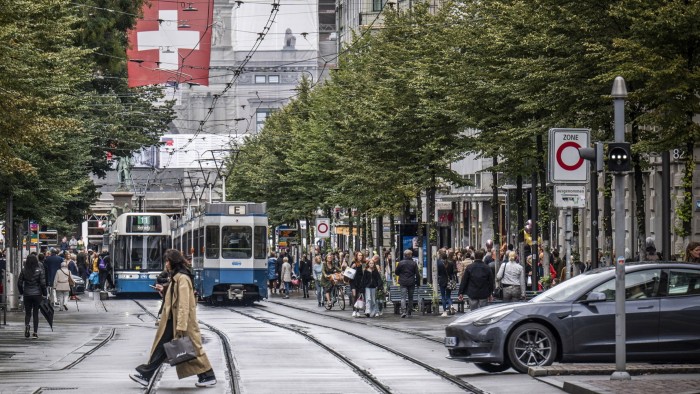Stay informed with free updates
Simply sign up to the European economy myFT Digest — delivered directly to your inbox.
Switzerland’s economy expanded 0.1 per cent in the second quarter, a sharp slowdown from the first three months of the year, when pharmaceutical companies accelerated exports in case US President Donald Trump hit the sector with tariffs.
Friday’s quarter-on-quarter GDP flash estimate for the April to June period was better than the 0.1 per cent contraction forecast by economists in a Bloomberg poll.
Nevertheless, it will add to the pressure on the Swiss central bank to potentially lower interest rates into negative territory to stimulate economic activity.
“Luck is running out for the Swiss economy,” Melanie Debono, an economist at advisory firm Pantheon Macroeconomics, wrote in a note to clients.
The second half of the year “will be ugly”, Debono warned, as Switzerland could plunge into a “short shallow recession” following Trump’s imposition earlier this month of a 39 per cent tariff on most Swiss goods — the highest level for any developed country.
The “reciprocal” duty level came as a shock to Switzerland, sparking criticism of the way Swiss President Karin Keller-Sutter handled negotiations.
Friday’s flash estimate by the State Secretariat for Economic Affairs did not come with many details. In its release, the Swiss statistical authority said a “negative performance in industry has been counterbalanced by gains in the services sector”. It will release more detailed GDP data for the second quarter on August 28.
The Swiss central bank in June cut interest rates by a quarter point to zero. It is facing increasing pressure to cut rates below zero as the strong Swiss franc — which has surged this year amid trade tensions — has been weighing on the economy. At 0.1 per cent, Swiss GDP growth in the second quarter was in line with the euro area.
Recommended
Annual inflation in Switzerland has already fallen close to zero in recent months. For the full year, the central bank is forecasting an inflation rate of just 0.2 per cent, the lower end of its target range.
“Given the combination of weak growth, low inflation and ongoing tariff risks, we expect the SNB [Swiss National Bank] to cut its policy rate by 25 [basis points] in September,” Goldman Sachs economists said in a note ahead of Friday’s GDP release.
While some major Swiss exports including pharmaceuticals are excluded from the “reciprocal” tariff level, it still applies to about 35 to 40 per cent of Swiss goods exported to the US, according to Debono.
She expects that Swiss corporate investment will remain dented due to “continued trade uncertainty”.
BNP Paribas economists warn that the tariffs could wipe out an additional 0.3 percentage points from Swiss GDP by the end of next year, bringing the total losses from trade tensions and geopolitical uncertainties to a full percentage point.
There was a sharp increase in pharmaceutical exports from Switzerland in the first quarter as companies in the US rushed to build stockpiles in case the sector was whacked with duties.

